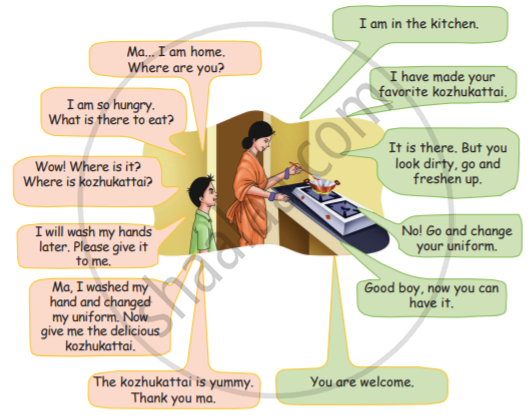Advertisements
Advertisements
प्रश्न
What is the script for children who cannot see called?
उत्तर
The script for children who cannot see is called Braille.
APPEARS IN
संबंधित प्रश्न
Form groups and use the following topic for discussion. Take the help of your college library and your teacher.
Freedom of speech
Prepare a speech in about 80-100 words for the morning assembly, stressing on the importance of games and sports in ensuring a healthy body and mind.
Work in groups of 4-6. Choose one folk art form, that is rarely or no longer performed.
Find out the reasons for this and suggest practical solutions/steps that can be taken to prevent this. After discussion and research, conduct a talk show in the class on the topic FOLK ARTS - A REVIVAL. The following inputs will help you.
|
Each group will consist of the following members. 1. The host NOTE: Your teacher will distribute role cards with cues to each member of the group to help you play your roles. |
Identify the character or speaker of the following line.
She stood petrified with astonishment peering over her glasses.
Mock anchoring for annual day celebration.
Read the different verb form where they remain the same in the direct and indirect speech in the following case. Fill in the blank with missing indirect speech.
In if-clauses and time-clauses.

Identify the poetic lines where the following figures of speech are employed and complete the tabular column.
| Figure of speech | Meaning | Lines |
| Synecdoche | A figure of speech in which a part is made to represent the whole or vice versa. e.g. “The Western wave was all a-flame. ” The “Western wave” is a synecdoche as it refers to the sea by the name of one of its parts i.e. wave. |
|
| Paradox |
A figure of speech in which a statement appears to contradict itself. e.g. To bring peace we must war. Be cruel to be kind. |
|
| Onomatopoeia |
A figure of speech wherein the word imitates the sound associated with the object it refers to. e.g. Pitter-patter, pitter-patter Raindrops on my pane. |
|
| Rhetorical Questions |
A figure of speech in the form of a question that is asked to make a point rather than to elicit an answer. e.g. And what is so rare as a day in June? |
See how they speak at this situation and practise as if you were in that situation.

Answer these questions about yourself.
- What is your name?
- What languages do you speak?
- How old are you?
- Which is your favourite food?
- Where did you go yesterday?
- Which country do you belong to?
- When do you go to sleep?
- Why do you drink milk?
Now it’s your turn to speak against the motion “Wars create more problem than they solve.” Express your views with valid points.
